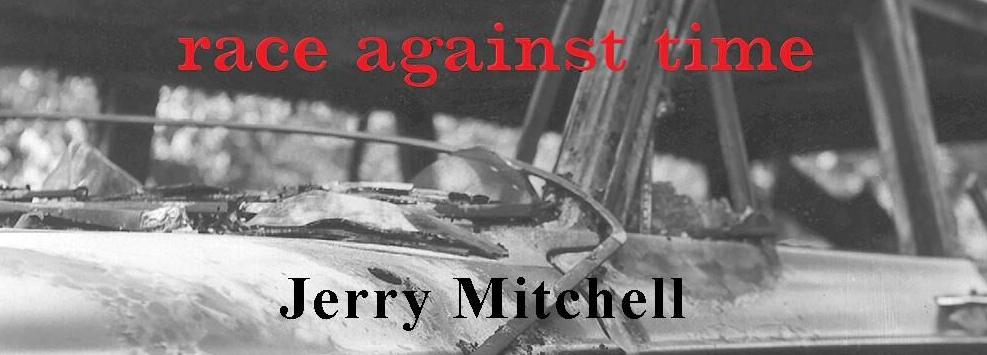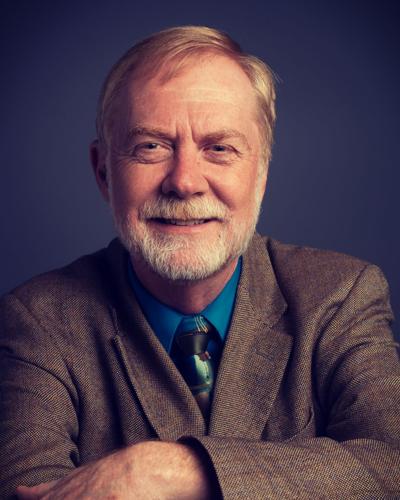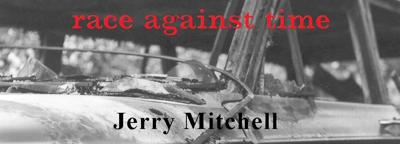Jerry Mitchell founded the Mississippi Center for Investigative Reporting in 2019. He is a Pulitzer Prize finalist and a winner of numerous awards, including the MacArthur “genius” grant, which came with a prize of $500,000. Mitchell worked at Mississippi's statewide paper, the Clarion-Ledger, from 1986 to 2019.
He is the author of "Race Against Time: A Reporter Reopens the Unsolved Murder Cases of the Civil Rights Era," which was released in 2020. Simon & Schuster, the publisher, says "Mitchell takes readers on the twisting, pulse-racing road that led to the reopening of four of the most infamous killings from the days of the civil rights movement, decades after the fact. His work played a central role in bringing killers to justice for the assassination of Medgar Evers, the firebombing of Vernon Dahmer, the 16th Street Church bombing in Birmingham and the Mississippi Burning case."

Jerry Mitchell
How did you get started on the path toward journalism?
At the end of my sophomore year in high school, they had a career day. Someone came, who had just graduated, and talked about journalism.
So, I took a journalism class when I was a junior, and then I was the editor of the paper when I was a senior.
I went to college at Harding University in Arkansas. I turned out to be too controversial to be the editor.
Really?
Oh yeah, I went to this very conservative college. I would make fun of the administration. I had a column, a satirical column, called Fifth Column. I love satire and was always making fun. I'll give an example: They decided to ban sandals.
For context, this is not 1972. This was 1981.
Did they ban sandals for everyone or just women?
Oh, everybody. They completely ban sandals. I wrote in my column, "The next thing they'll be telling us is that the apostles wore Nikes."
I always viewed satire as a funny way of telling the truth — and I always liked that.
I started working at this series of smaller papers. It was wild.
I've got a bunch of stories, but two stories, one from my high school journalism career and one from my college are great examples. The one from high school is that Ronald Reagan came to my hometown. It's 1976. He's campaigning for president against Gerald Ford.
Reagan arrives in my hometown, Texarkana, at the airport and he's with Jimmy Stewart, who was campaigning with him. I met both of them. You have to understand what I looked like at the time. I looked like dang Opie, you know, like red, bright red hair. I looked like I was 12. I did not look like I was 17.
Reagan spoke. Nothing like what happened next would ever happen anymore, but he went around and shook hands with a crowd who were behind a tall, chain-link fence. Reagan's aid comes around to the media and asked if anyone had a question for the governor. I said, "Yes, I do."
This guy obviously had no idea that I read three newspapers a day. I was an absolute news junkie. Reagan comes around and says, "I understand you have a question."
"Yes, I do, Governor," I said. "I was just wondering what you thought about the presence of Cuban troops in Angola."
You can imagine the eyes of the aid because he's seen my little name tag with the "Tiger Times," a high school paper. You know he's thinking that this is going to be a softball, right? And Reagan started answering the question. Then, the aide literally drags him away from me. Ha! In retrospect, that always cracks me up — Reagan got dragged away from a question asked by the "Tiger Times" reporter.

"Race Against Time: A Reporter Reopens the Unsolved Murder Cases of the Civil Rights Era" by Jerry Mitchell was published in 2020 by Simon & Schuster.
My other story is I hung out all day in Arkadelphia, Arkansas, with Bill and Hillary Clinton during his 1982 comeback campaign for governor. My editors had asked me to ask him a question about a rate hike while he was attorney general by Arkansas Power and Light. We were at a local bank, and I ask him about this. He looked me straight in the eye, put his hand on my shoulder. We talked for 45 minutes. We got done. I started walking to the parking lot, got about halfway to my car and I realized he hadn't answered my question. I was a young reporter. I didn't know any better.
I would say Clinton is probably the most charming person I've ever met in person.
How did you get into the investigative side of journalism?
I was working with a small paper in East Texas, in Carthage. I had an editor there who had been a state house reporter. He asked me, "So, what do you think you want to do in journalism?"
I replied, "I'm thinking about investigative reporting."
He asked, "Have you ever read 'All the President's Men'? I said, 'No, I've seen the movie, but I haven't read the book.' He said, 'Read the book and study how they use attribution.' It was absolutely some of the best advice about journalism I ever got.
From that moment forward, "All the President's Men" became my bible on how to do investigative reporting.
Where do you think the roots of your sense of justice came from?
My mom and dad, especially my dad. They very much had a sense of right and wrong — that people shouldn't be allowed to get away with injustices, like the cases I worked on in Mississippi.
My mom and dad are people of faith. They're Christians and I am too — and that faith plays a role in that. The thing that was so awful about the Mississippi cases, in my opinion, was not just that these guys get away with murder, but everybody knew they got away with murder.
Everyone knew who killed Medgar Evers. Everybody knew it was Byron De La Beckwith.
Yeah, it just really got under my skin.
As a human, how do you deal with what's going on now in the bigger political world?
Oh, that's a good question. You want to see justice done — and when justice isn't done, there are implications. You saw it in Mississippi. If you go back and look at some of these cases, Klansmen would go out and be involved in a beating of somebody, right?
And they never prosecuted them.
Later on, guess what happened? That same Klansman went out and killed somebody. So there, there's a price to be paid when you don't punish — when you don't have true justice. You have to have truth in order to have justice.
Obviously, these cases were not full justice, I'd be the first to admit that. They're partial justice, but even if you can't have full justice, you can still have truth.
And that's what I think is getting lost — everything is getting so blurry now.
Everyone wants to say, "Well, I can have my truth and you can have your truth." Or people believe incredible lies. Many people are getting the vast majority of their news now through social media.
But if the only way you're getting your news is your Facebook feed. God forbid, you're going down the wrong road.
How did you balance your work as a journalist and taking the time to write the book?
Oh, it was tough. I had a book deal. This is going to make me sound awful, but I got my book deal in 2009. My editor originally wanted me to make a kind of half history, half memoir — and I never could make it work.
He eventually passed me off to a younger editor. I showed him what I had. He was like, "Well, I think the book is a memoir." I was like, "Yeah, that's what I want to do too."
Who are your heroes?
Well, I have a lot of heroes. As a person of faith, one of my favorite characters is King David. I love King David. I love the Psalms. In the journalism realm, I just love, obviously, Woodward and Bernstein. I love the investigative reporters — Ida B. Wells, Nellie Bly. These are my heroes.
Let's talk about King David as your hero, because he certainly had his flaws, didn't he?
He did. Well, what appeals to me about King David is, from a faith perspective, how passionate he is.
I mean, just read the Psalms. I'll tell this about myself. I hit a really low point in my life in 1999, and I found myself starting to read the Psalms. I had never connected with the Psalms before and suddenly I connected with them in a big way.
You know, I don't mind being public about it. I was into porn and my wife at the time caught me, and at the time it was the worst thing that ever happened to me. Now I tell you it's the best thing that ever happened to me. It forced me to reexamine my life and think about who I was.
I probably have read the Psalms like 40 times. It echoed in my soul in a way that it never had before.
How have you kept your faith?
That's a good question. God has always been a refuge. I feel he healed me through the Psalms. I love Psalms 18 — this is a part that just echoed with me. This is King David speaking (in Psalms 18:16-20), he said, "But he caught me, reached all the way from sky to sea; he pulled me out of that ocean of hate, that enemy chaos, the void in which I was drowning. They hit me when I was down, but God stuck by me. He stood me up on a wide-open field. I stood there saved, surprised to be loved. God made my life complete when I placed all the pieces before him."
And that's it from "The Message," a paraphrase of the Bible. I love "The Message." It just echoed in my soul because my whole life I tried to say, "OK, God, you can have all of my life except this part — porn and whatever else."
It made me realize, you know, God wants it all. He doesn't want us to try to put ourselves back together. He wants us to just give Him the pieces.
What work are you most proud of?
I might shock people, but I hope it's being a good dad.
The work I'm doing now, from a faith perspective — I think I'm not very important, but I think our reporting is incredibly important. I think journalism is one of the world's most noble professions.
I'll get more trouble for this part, but I will say this to people. We're in the Bible Belt and there's this push now that people don't want their students, their kids to learn "things that make them uncomfortable," like uncomfortable history or tragic history or whatever.
My question is: Do you think it's important for kids to read the Bible? Does the Bible contain tragic stories?"
Well, yes, it does — very tragic stories. But you still want kids to read it. Why? Because you can learn from it.
So, what's the difference? I don't understand the difference. We're trying to learn from our history. As Myrlie Evers, the widow of Medgar Evers, has said, we keep repeating our history because we don't know our history. And that's what I see today. It's very troublesome this idea of, "Oh, we don't really want to learn this history — or "it's too sad." Or, "It's too uncomfortable." And this is not just Black history. This is our history. This is American history. We need to understand and accept that we can learn from it.
Some of Mitchell's answers have been edited for brevity.




